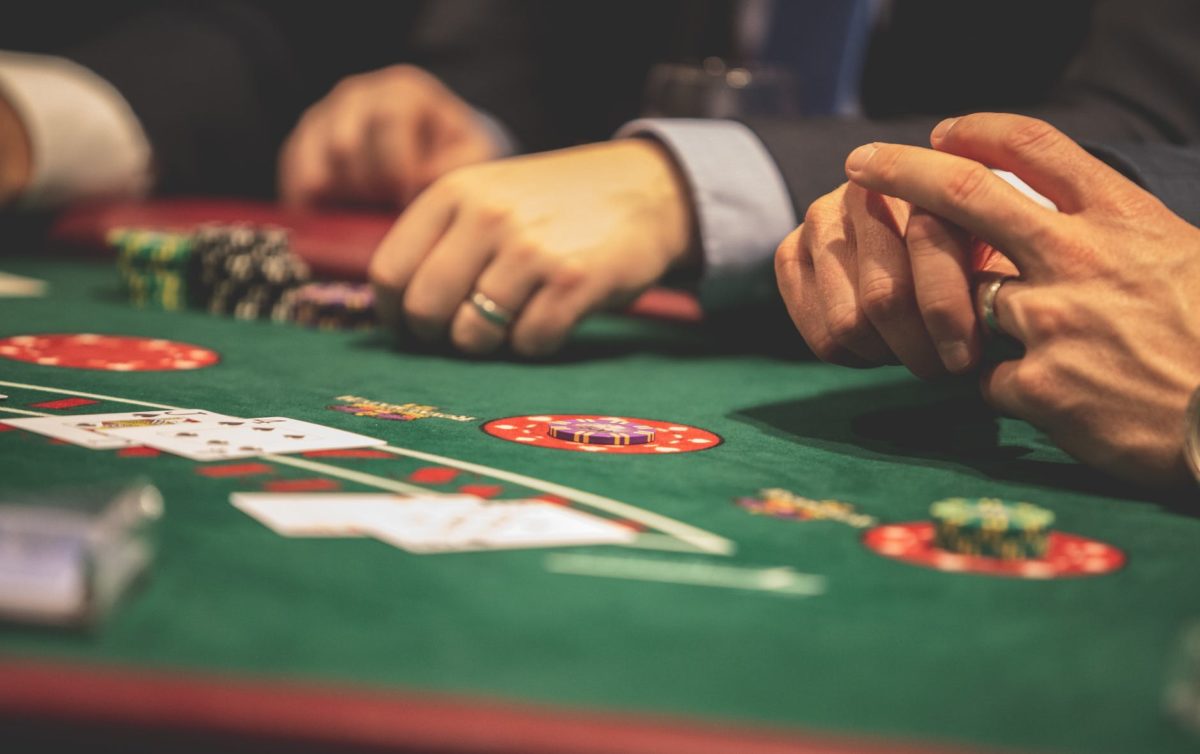
Table of Contents
Gambling Addiction is more common than most of us know! To start with, what is gambling?
Gambling is defined as risking something of value, usually, money, on the outcome of an event decided at least partially by chance. A study shows that four in five Americans say they have gambled at least once in their lives. Also, as much as $5 billion is spent on gambling in the United States every year.
Some other terms you may see in place of Gambling Addiction are Gambling Disorder, Pathological Gambling, Compulsive Gambling, and Problem Gambling. However, the correct designation, according to the DSM-5, is Gambling Disorder.
While gambling may be an expensive entertainment for some, it is a distressing disorder for many others. Of course, not everyone who goes to a casino or bets on horses becomes addicted to gambling. Most casual gamblers do not develop compulsive gambling. Some studies have, however, suggested that certain people may be more vulnerable to gambling addiction.
In the past, gambling disorder was regarded as more of a compulsion than an addiction. New studies, however, show a better understanding of the biology of this disorder.
The ability to gamble online makes this problem even worse. Many gambling websites help to fuel this addiction. Also, ready access to the internet makes this addiction even more challenging to manage. This disorder can ruin different aspects of an individual’s life. Some examples are the effects on academic performance, relationships, finances, responsibilities, jobs, and self-esteem.
Where do I begin? There is a lot of history when it comes to gambling.
History shows that humans love to gamble and have done so for, perhaps, thousands of years!
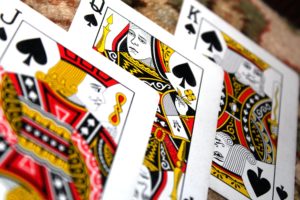 It is believed that playing cards first appeared in China in the 9th century. The cards previously had human forms, and later Kings and Queens as the games spread to Europe. In China, there are also indications of simple games of chance discovered on tiles.
It is believed that playing cards first appeared in China in the 9th century. The cards previously had human forms, and later Kings and Queens as the games spread to Europe. In China, there are also indications of simple games of chance discovered on tiles.
The oldest known dice were found in Egypt. Greek and Roman pottery indicate that betting on animal fights was common. “White pigeon ticket” was played in gambling houses in China around 200 BC, with permission of the province governor. It was thought that the governor received a percentage of the profits, which was used to fund state projects.
The first casinos appeared in Italy in the 17th century. Roulette and Vingt-et-un were brought to the United States from France. Wealthy businesspeople and farmers gambled on the Mississippi steamboats. A version of poker was being played in New Orleans in 1829.
Sittman and Pitt in New York made the first gambling machine. The first video slot was developed in 1976.
There are now several available gambling opportunities. This diversity of gambling means there are also different types of gambling addiction. As a result, it may not always be obvious when someone has pathological gambling.
Some of the common types are:
The above list is by no means exhaustive. There are several different types of gambling.
Mobile gambling refers to playing games of chance or skill for money by using a remote device such as a tablet or smartphone with a wireless internet connection. Most of the big casinos now have a mobile platform for their players.
The mobility of gambling has attracted a new crop of players. Handheld devices are now commonly used to gamble. The immediate access, convenience, and interactions with social networks, mean gambling is even more of a problem with this generation. There are now many gambling sites with mobile apps, thus fueling this disorder.
As of 2015, the predicted Jupiter Research report for mobile casino games was over $48 billion US dollars in revenue. It should be interesting to find out exactly what this number is today!
There are several reasons why people gamble. Some of these factors include the following:
Many studies show genes affect gambling. This association is similar to that found with illicit drugs and alcohol. The following show an increased likelihood of gambling:
For many people, the urge to gamble comes from the supposed financial incentive of winning large sums of money. In some cases, this may start with financial problems. On the contrary, several other individuals who gamble have no monetary difficulties.
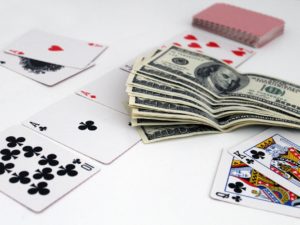 People who have issues with money gamble in the hopes that they can use the winnings to offset their deficits. As a result, they take huge risks, usually leading to huge losses. In spite of this, the process continues in an attempt to win back the losses. A vicious cycle often ensues, and this can be very hard to break. Even though gamblers may sometimes win massive amounts, it is rarely enough to cover up previous losses. Most people who are addicted to gambling tend to run in the deficit.
People who have issues with money gamble in the hopes that they can use the winnings to offset their deficits. As a result, they take huge risks, usually leading to huge losses. In spite of this, the process continues in an attempt to win back the losses. A vicious cycle often ensues, and this can be very hard to break. Even though gamblers may sometimes win massive amounts, it is rarely enough to cover up previous losses. Most people who are addicted to gambling tend to run in the deficit.
In addition, some people gamble due to the emotional high (euphoria) and excitement they experience. In a way, this is similar to the experience of taking illicit drugs. Unfortunately, this can very quickly lead to problem gambling.
Some people are thrill-seekers. Such a personality trait may make such people more likely to gamble than others.
Of course, there is also the issue of mental disorders. Depression, anxiety, obsessive-compulsive disorder (OCD), and bipolar disorder (especially when manic) are examples of illnesses that can contribute to people gambling.
Recent studies have shown that gambling and drug addiction are quite similar. The reward system in the brain is responsible for releasing dopamine. This dopamine release is what causes pleasure from things like food and sex.
However, when the reward system is stimulated by cocaine, opioids, methamphetamines, and other drugs, the release of dopamine can be up to ten times the normal amount. As a result of this, using drugs continuously decreases the ability to cause a “high.”
Further use of drugs causes the brain to adapt, hence producing less dopamine and becoming less responsive to its effects. Tolerence thus develops. This means larger amounts of drugs are needed to get high. Also, stopping the drugs causes withdrawals.
The prefrontal cortex is a part of the brain that helps control impulses. Drug use causes a weakening of the connection between the reward system and the prefrontal cortex. This, therefore, makes it even harder to stop using drugs.
This process also applies to gambling addiction!
Gambling can present in a diverse range of people. However, the following groups have been shown to have problem gambling more commonly:
Gamblers Anonymous (GA) is a fellowship of men and women who share their experience, strength, and hope with each other. They aim to solve their gambling addiction and help others in the process. GA has 20 questions they ask of new members. Most compulsive gamblers answer positively to at least 7 of these questions. The questions asked are:
According to the Illinois Institute for Addiction Recovery, there are four phases in gambling addiction:
Winning Phase:
In this phase, the perception of a winning streak makes the individual continue to gamble. It often starts with a huge win. This success causes a lot of excitement and leads to a positive view of gambling. Because of the big win, such individuals may begin to see themselves as talented. This feeling also leads to the hope that they will continue to win. As a result, they spend more money and time gambling.
Losing Phase:
This is the phase were problem gamblers “chase” their losses. They continue to gamble after losing money. This is usually an attempt to earn back what they’ve lost. That slight chance of winning back some money keeps them going and fuels this habit. This is when they begin to borrow money, default on debts, lie to family, friends and colleagues, miss work and school, gamble alone, and isolate.
Desperation Phase:
There is a loss of control in this phase. Even though there is a lot of guilt and shame after gambling, they are unable to stop. They begin to hope for a big win to offset their losses. For this reason, they take huge risks while gambling. They also become desperate to raise money for their addiction. Indeed, some people may end up stealing and cheating. Job loss, school dropout, relationship breakups, and legal issues may occur due to this.
Hopeless Phase:
This is the phase where compulsive gamblers “hit rock bottom.” They become so hopeless and helpless and give up on even trying to get help. At this phase, some gamblers use drugs and alcohol to self medicate. Some individuals may consider and even attempt suicide. This is, perhaps, because they feel the burden from their losses is too heavy to bear.
According to the DSM-5, the proper designation is Gambling Disorder. It is classified under Substance-Related and Addictive Disorders. People with gambling disorder may present with:
Do people with pathological gambling develop withdrawals when they stop gambling? Many individuals have described several symptoms when they try to cut down on this habit. Some of such withdrawals are:
Family members and friends may pick up some concerns with gamblers’ behaviors. Some of such red flags are:
Healthcare providers need to screen for gambling. This is because very few people seek help for gambling addiction, but instead request for treatment of other mental and medical issues. Besides, there are no visible signs to indicate they have such a habit.
Some screening tools for gambling addiction are:
Brief Screening Tools
Diagnostic Screening Tools
People with compulsive gambling are more likely to have other mental health issues. Some of these conditions include:
In addition, gamblers are more likely to have the following issues:
People with gambling disorder tend to have more issues with drugs and mental illness. The National Epidemiologic Survey on Alcohol and Related Conditions showed the following:
Gambling addiction is associated with suicidal thoughts, suicidal attempts, and completed suicide. Many risk factors contribute to this. Depression and other mental illness, financial difficulties, legal problems, and substance abuse (alcohol and drugs) are the commonest.
The pain, stress, and isolation that comes with gambling disorder may cause some people to feel hopeless. Some studies have shown that up to 50% of individuals with compulsive gambling have suicidal thoughts. Also, about 17% have attempted suicide.
How do you treat gambling addiction?
Only about 10% of people with a gambling problem seek treatment. When gamblers seek help, it is usually due to financial pressures and intervention from family. The treatments for gambling disorder are similar to methods of treating other addictions. These include the use of medications, therapy, residential treatment, and support groups.
There are no medications specifically approved for compulsive gambling. However, drugs like naltrexone (ReVia) show positive responses. Some other medications show benefits in small studies. These include carbamazepine (Tegretol), topiramate (Topamax), Lithium (Lithobid, Eskalith), fluvoxamine (Luvox) and clomipramine (Anafranil). None of these medications are, however, approved by the FDA for treating gambling addiction.
Gamblers may have other addictions and mental illness. Because of this, it is crucial to diagnose and treat these disorders.
There are approved drugs for treating addiction to alcohol and opioids. Medication-Assisted Treatment involves using medications to treat addiction. Such medications include naltrexone, buprenorphine, methadone, disulfiram, and acamprosate. Antidepressants and anti-anxiety medications help treat ongoing depression and anxiety. Mood stabilizers and antipsychotics are also helpful, depending on the co-occurring mental issues.
There are several different types of therapy. One of the commonest forms is Cognitive-Behavioral Therapy (CBT). This form of therapy aids in developing a positive skillset. It helps people understand the relationship between thoughts, emotions, and behaviors. Redirection, visualization, and distraction are some of the methods available for dealing with gambling urges.
CBT techniques help with negative thinking and cognitive distortions. This form of therapy can help people deal with their stressors, as well as identify and change their behaviors. CBT also helps with their way of thinking that may lead to negative consequences. It helps obtain motivation to change and cultivate ideas to avoid gambling.
Family therapy is also quite helpful. Gamblers’ family members may have a lot of anger and distrust. Addressing these feelings is necessary. Also, gambling may offer intermittent financial rewards. Because of this, some family members may even be angry when the patient stops gambling and bringing home these gains. Resolving these issues will go a long way in repairing the family dynamics.
Inpatient or residential treatment facilities are helpful for people who need time away from their regular environment to help with staying sober. Such individuals usually need round-the-clock support and monitoring to prevent gambling.
The first gambling residential treatment center was based on a program for people with alcohol use disorder. It was started in 1972 at the Brecksville, Ohio Veterans Administration Hospital.
Residential treatment helps individuals identify their gambling triggers, learn to avoid high-risk situations, and also develop skills for dealing with urges. Providing consistent individual therapy, group sessions, and other therapies help with this. Medications may also be an option.
In addition to these, such programs also arrange for proper after-care planning to ensure success. This discharge plan may include identifying a sound support system, addressing legal and medical issues, recommending support groups, making suggestions for financial planning, and referring to professional healthcare providers for therapy and, perhaps, medications.
Gambling Anonymous is a gambling support group. In this fellowship, men and women share their experiences, strengths, and hopes with each other. The goal is recovery from gambling. Membership is free, and the organization is self-supporting. It has no religious or political affiliations.
In addition to acting as a support network, groups also serve as a sounding board. Talking and listening to others in a group can help put an individual’s problems into perspective. Of course, there is also the advantage of being held accountable by other members of the group.
Another benefit of group therapy is diversity. People have different backgrounds and personalities. This means different ideas can be brought up in group sessions. Such a variety of insights can help others understand and tackle their issues even better.
In some groups, autobiography helps. This involves people writing a history of their gambling lives and reading this to the group. The process of relaying such personal information, in addition to the feedback received is usually quite an emotional experience. This undoubtedly contributes to the recovery process.
Coping with gambling addiction is tough. Despite proper treatment, maintaining sobriety can be quite tasking. It is vital to have good social support. Growing and strengthening ties with family and friends go a long way to help with recovery. Interacting more with work colleagues, engaging with sports groups, volunteering, and joining local clubs are other ways of building good social support.
In addition to the above treatments for gambling, individuals need to be proactive. Making a conscious decision not to gamble is essential. Also, better money management is essential. Without money, there will be no gambling. Getting rid of credit cards, closing betting accounts, and only carrying limited cash are helpful ways to help curb this addiction. It is also crucial to fill up free time with healthier habits. Furthermore, avoiding environments likely to cause gambling is important.
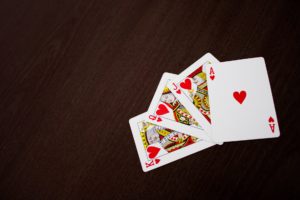 Treatment for gambling addiction works for many individuals. However, preventing relapse remains a challenge. For some people, staying in recovery may even be harder than quitting. The internet and general easy accessibility to gambling make it tough for people to abstain. Cell phones and computers make access to online gambling super easy.
Treatment for gambling addiction works for many individuals. However, preventing relapse remains a challenge. For some people, staying in recovery may even be harder than quitting. The internet and general easy accessibility to gambling make it tough for people to abstain. Cell phones and computers make access to online gambling super easy.
Just like people who abuse drugs are likely to relapse, this is also the case for gambling. After quitting, a single episode of gambling can quickly spiral out of control. Hence, the need to prevent and avoid the temptation to gamble.
Many factors play a role in preventing relapse. Some of these are related to the environment. On the other hand, some others are due to the individual.
Positive patterns of behavior help with the recovery process. This may, however, require new lifestyle skills. To ensure success with preventing relapse, it is essential for an individual to build these new behaviors into daily life. Substituting old habits with new healthy ones go a long way. Some examples include taking on new hobbies, exercising, changing social circles, and avoiding trigger locations.
The intense urge to gamble during recovery is normal. Experiencing such cravings is commonplace in people who have pathological gambling. Some of the ways of coping with these cravings include:
I wrote a previous article that gives more details about how to stop cravings. You should check this out.
Note that overcoming gambling disorder is tough! Even though slips may occur, you need to pick up yourself and get back on your recovery process.
There are many resources available to help with gambling disorder.
Gambling Disorder is variously referred to as Gambling Addiction, Pathological Gambling, Compulsive Gambling, and Problem Gambling. According to the DSM-5, however, the correct term is Gambling Disorder.
Gambling opportunities are diverse and include casino-style card games, slot machines, bingo, raffle and lottery tickets, horse race betting, and online gambling. Just as is the case with addiction to drugs, gambling is also associated with the brain reward system and dopamine. This disorder tends to be commoner in men than women. It is also seen more often in young adults, singles, and low socioeconomic status. The four phases of gambling addiction are: Winning Phase, Losing Phase, Desperation Phase, and Hopeless Phase.
People who have a problem with gambling tend to have a higher incidence of drug abuse and mental illness. Suicides are also more prevalent than in the general population. Many screening tools help to diagnose people with compulsive gambling. Some examples are NORC Diagnostic Screen, SOGS, and BBGS.
Treatment of gambling disorder may include the use of medications, counseling, residential facilities (rehab), support groups (such as Gambling Anonymous), and a good social support network. Ultimately, the first step is accepting to get help. Many individuals have recovered from the hold of this addiction and are back living their normal lives. Recovery is possible!
Have you suffered from compulsive gambling? Do you know a family member or friend who has? Please leave your comments on your experiences and share this article with others who may need help.
Subscribe to get our latest content by email.
The entire content of AddictionBlueprint, including content on drugs and alcohol, medications, therapies, facilities, spotlights, recommendations, and other features is for informational purposes only. It is not intended to be a substitute for professional medical advice, diagnosis or treatment. This does not constitute a physician-patient relationship. Please seek the advice of your physician or other qualified health providers regarding your addiction, mental and medical issues.

Jun 2019

Jul 2019
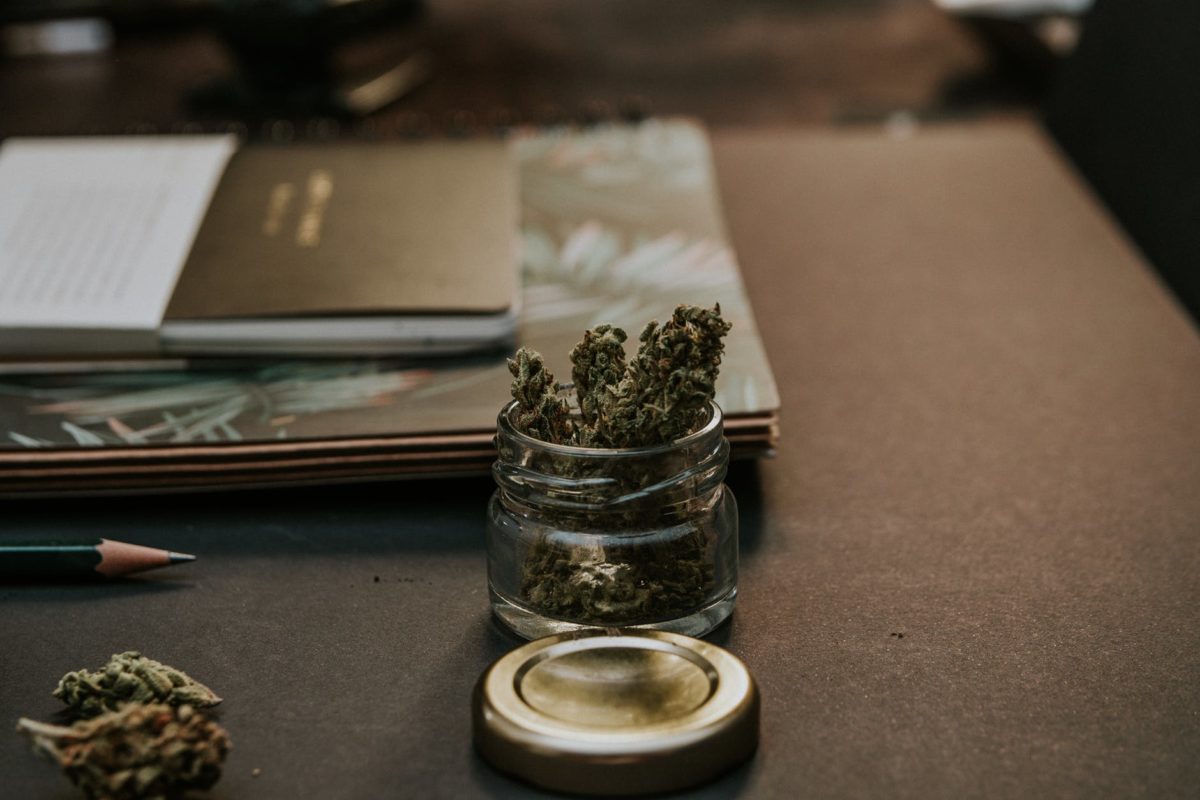
Jul 2019
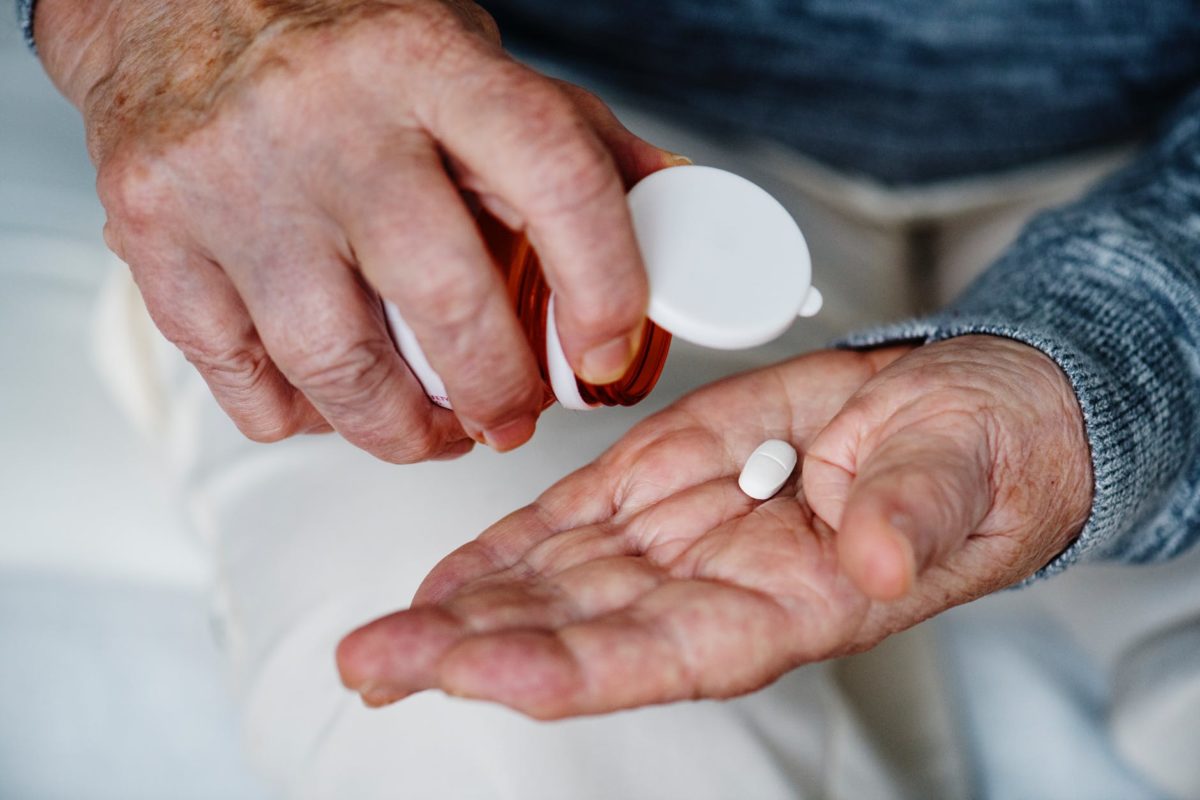
Jul 2019

Aug 2019

Oct 2019

Sep 2019

Oct 2019
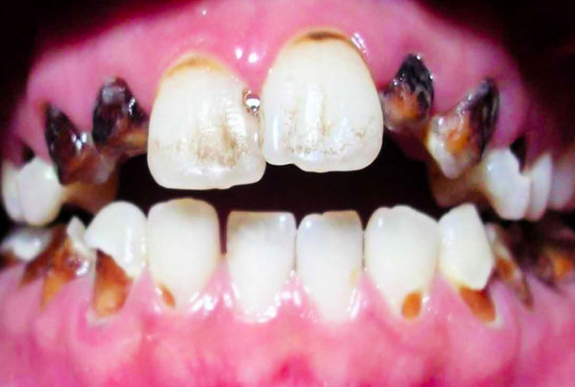
Nov 2019

Dec 2019

Dec 2019

Jan 2020

Jan 2020

Jan 2020

Jan 2020

Feb 2020

Mar 2020

Feb 2020

May 2019
Do you want to become a Canadian citizen and have a business?
https://arnikavisa.com/canada-investor-visa-learn-about-investment-immigration
Hi, unfortunately, I faced challenges with the slow loading speed of your website, leading to frustration. I recommend a service, linked below, that I’ve used personally to significantly improve my website speed. I really love your website…Optimize now
How about your site
Click here
Aw, this was a really nice post. In thought I want to put in writing like this additionally – taking time and precise effort to make a very good article… but what can I say… I procrastinate alot and certainly not seem to get one thing done.
What’s Happening i am new to this, I stumbled upon this I have found It absolutely helpful and it has aided me out loads. I hope to contribute & aid other users like its helped me. Good job.
you’ve got a terrific weblog right here! would you wish to make some invite posts on my weblog?
Spot on with this write-up, I truly assume this web site wants way more consideration. I’ll in all probability be once more to read much more, thanks for that info.
It’s so important to shine a light on issues like this that often fly under the radar, and your article does a fantastic job of breaking down the stigma surrounding gambling addiction. Your emphasis on the need for personalized treatment plans and ongoing support for individuals struggling with this addiction is spot on.
Artà Mallorca
Hi , I do believe this is an excellent blog. I stumbled upon it on Yahoo , i will come back once again. Money and freedom is the best way to change, may you be rich and help other people.
Dead pent written content, appreciate it for information. “In the fight between you and the world, back the world.” by Frank Zappa.
Thanks for another magnificent post. The place else may just anybody get that type of info in such an ideal way of writing? I’ve a presentation subsequent week, and I’m on the search for such info.
I like this website so much, bookmarked.
Hi, Neat post. There’s a problem with your website in internet explorer, would check this… IE still is the market leader and a good portion of people will miss your magnificent writing because of this problem.
Definitely imagine that which you stated. Your favourite reason seemed to be at the web the simplest factor to understand of. I say to you, I certainly get irked whilst other people consider worries that they plainly do not realize about. You managed to hit the nail upon the top as neatly as defined out the whole thing with no need side effect , people could take a signal. Will probably be again to get more. Thank you
you’re in point of fact a excellent webmaster. The site loading pace is amazing. It kind of feels that you are doing any unique trick. Also, The contents are masterpiece. you have performed a magnificent job in this topic!
Hi there! This post couldn’t be written any better! Reading through this post reminds me of my previous room mate! He always kept talking about this. I will forward this article to him. Pretty sure he will have a good read. Thank you for sharing!
hey there and thank you for your information – I have certainly picked up anything new from right here. I did however expertise several technical issues using this site, as I experienced to reload the web site many times previous to I could get it to load correctly. I had been wondering if your web hosting is OK? Not that I’m complaining, but slow loading instances times will very frequently affect your placement in google and can damage your high-quality score if ads and marketing with Adwords. Anyway I am adding this RSS to my e-mail and could look out for a lot more of your respective intriguing content. Ensure that you update this again very soon..
I like the helpful information you provide in your articles. I’ll bookmark your blog and check again here frequently. I’m quite sure I will learn many new stuff right here! Best of luck for the next!
Hiya, I’m really glad I’ve found this information. Nowadays bloggers publish just about gossips and web and this is really irritating. A good site with exciting content, this is what I need. Thanks for keeping this web-site, I will be visiting it. Do you do newsletters? Can’t find it.
Thanx for the effort, keep up the good work Great work, I am going to start a small Blog Engine course work using your site I hope you enjoy blogging with the popular BlogEngine.net.Thethoughts you express are really awesome. Hope you will right some more posts.
There is evidently a lot to know about this. I think you made certain nice points in features also.
I love the efforts you have put in this, thanks for all the great posts.
Very interesting info !Perfect just what I was searching for! “I myself do nothing. The Holy Spirit accomplishes all through me.” by William Blake.
Today, while I was at work, my sister stole my iPad and tested to see if it can survive a forty foot drop, just so she can be a youtube sensation. My apple ipad is now broken and she has 83 views. I know this is completely off topic but I had to share it with someone!
демонтаж москва
https://demontagmoskva.ru/
What is Alpha Tonic? Alpha Tonic stands as a natural health supplement designed to comprehensively address men’s overall well-being.
Greetings! I know this is somewhat off topic but I was wondering if you knew where I could find a captcha plugin for my comment form? I’m using the same blog platform as yours and I’m having difficulty finding one? Thanks a lot!
What Is Puravive? Puravive is a weight loss supplement that works to treat obesity by speeding up metabolism and fat-burning naturally.
Understanding COSC Certification and Its Importance in Watchmaking
COSC Validation and its Rigorous Standards
Controle Officiel Suisse des Chronometres, or the Controle Officiel Suisse des Chronometres, is the authorized Swiss testing agency that attests to the precision and accuracy of timepieces. COSC validation is a symbol of excellent craftsmanship and dependability in chronometry. Not all timepiece brands seek COSC certification, such as Hublot, which instead follows to its own strict criteria with mechanisms like the UNICO, reaching similar accuracy.
The Art of Precision Chronometry
The core system of a mechanical watch involves the mainspring, which provides energy as it loosens. This mechanism, however, can be vulnerable to external factors that may impact its precision. COSC-accredited movements undergo rigorous testing—over fifteen days in various circumstances (five positions, 3 temperatures)—to ensure their durability and dependability. The tests evaluate:
Average daily rate accuracy between -4 and +6 secs.
Mean variation, highest variation rates, and impacts of thermal variations.
Why COSC Validation Matters
For watch aficionados and collectors, a COSC-validated watch isn’t just a piece of technology but a proof to enduring excellence and precision. It signifies a watch that:
Presents exceptional dependability and precision.
Provides assurance of quality across the whole construction of the watch.
Is probable to retain its value more effectively, making it a sound choice.
Popular Timepiece Brands
Several well-known brands prioritize COSC validation for their timepieces, including Rolex, Omega, Breitling, and Longines, among others. Longines, for instance, offers collections like the Archive and Spirit, which showcase COSC-accredited movements equipped with advanced substances like silicon balance springs to improve durability and efficiency.
Historical Background and the Evolution of Timepieces
The idea of the timepiece originates back to the need for precise chronometry for navigational at sea, emphasized by John Harrison’s work in the 18th cent. Since the formal establishment of COSC in 1973, the validation has become a standard for judging the accuracy of luxury watches, maintaining a tradition of excellence in watchmaking.
Conclusion
Owning a COSC-accredited watch is more than an visual selection; it’s a commitment to excellence and precision. For those appreciating accuracy above all, the COSC certification offers peace of mind, ensuring that each accredited timepiece will perform reliably under various circumstances. Whether for individual satisfaction or as an investment, COSC-validated watches distinguish themselves in the world of watchmaking, carrying on a tradition of careful chronometry.
<a href=[Link deleted]ли usdt
Анализ Тетер в чистоту: Каковым способом защитить личные криптовалютные средства
Все больше граждан заботятся к безопасность их электронных финансов. Ежедневно обманщики предлагают новые подходы разграбления цифровых средств, или держатели цифровой валюты являются страдающими их интриг. Один из техник обеспечения безопасности становится тестирование кошельков для присутствие нелегальных финансов.
С какой целью это потребуется?
Преимущественно, для того чтобы сохранить свои средства от мошенников и похищенных монет. Многие инвесторы сталкиваются с риском потери своих активов в результате мошеннических механизмов или краж. Осмотр кошельков способствует выявить подозрительные действия и также предотвратить потенциальные потери.
Что мы предлагаем?
Мы предоставляем услугу проверки криптовалютных бумажников и также транзакций для выявления начала фондов. Наша технология проверяет информацию для выявления нелегальных транзакций или проценки риска для вашего счета. За счет данной проверке, вы сможете избежать проблем с регуляторами а также обезопасить себя от участия в незаконных операциях.
Каким образом это работает?
Наша команда сотрудничаем с передовыми аудиторскими компаниями, такими как Halborn, с целью предоставить аккуратность наших тестирований. Мы применяем передовые технологии для выявления опасных операций. Ваши информация обрабатываются и хранятся в соответствии с высокими стандартами безопасности и приватности.
Как выявить собственные USDT в нетронутость?
При наличии желания проверить, что ваша USDT-бумажники нетронуты, наш подход предоставляет бесплатное тестирование первых пяти кошельков. Просто введите местоположение вашего кошелька в на нашем веб-сайте, и мы предоставим вам детальный отчет о его положении.
Защитите вашими средства прямо сейчас!
Не подвергайте опасности стать жертвой мошенников либо попасть в неблагоприятную обстановку вследствие незаконных сделок. Обратитесь за помощью к нашему агентству, с тем чтобы сохранить ваши криптовалютные средства и избежать затруднений. Совершите первый шаг к безопасности криптовалютного портфеля прямо сейчас!
<a href=[Link deleted]USDT на чистоту
Тестирование USDT в чистоту: Каким образом обезопасить личные цифровые состояния
Каждый день все больше людей обращают внимание к безопасность своих электронных средств. Постоянно шарлатаны разрабатывают новые методы хищения электронных средств, и собственники криптовалюты становятся пострадавшими их обманов. Один из методов охраны становится проверка кошельков в присутствие нелегальных денег.
С какой целью это важно?
Прежде всего, для того чтобы защитить личные средства от мошенников или похищенных монет. Многие специалисты сталкиваются с риском утраты своих активов по причине обманных механизмов либо кражей. Тестирование бумажников позволяет выявить подозрительные операции а также предотвратить возможные потери.
Что мы предоставляем?
Наша компания предлагаем услугу проверки криптовалютных бумажников или транзакций для выявления источника денег. Наша система проверяет информацию для обнаружения нелегальных операций а также оценки риска для вашего портфеля. Благодаря этой проверке, вы сможете избежать недочетов с регуляторами а также защитить себя от участия в незаконных операциях.
Как это работает?
Мы сотрудничаем с ведущими проверочными агентствами, вроде Cure53, чтобы обеспечить точность наших проверок. Мы внедряем новейшие технологии для обнаружения рискованных транзакций. Ваши информация обрабатываются и сохраняются в соответствии с высокими стандартами безопасности и конфиденциальности.
Как проверить свои USDT в чистоту?
Если хотите убедиться, что ваша Tether-кошельки чисты, наш сервис предлагает бесплатную проверку первых пяти кошельков. Легко вбейте местоположение вашего кошелька в на нашем веб-сайте, и также мы предоставим вам подробный доклад о его статусе.
Обезопасьте вашими фонды уже сейчас!
Не подвергайте опасности подвергнуться мошенников либо оказаться в неприятную обстановку по причине незаконных операций. Посетите нашему агентству, для того чтобы обезопасить ваши криптовалютные средства и избежать неприятностей. Сделайте первый шаг к сохранности вашего криптовалютного портфеля уже сегодня!
Cá Cược Thể Thao Trực Tuyến RGBET
Thể thao trực tuyến RGBET cung cấp thông tin cá cược thể thao mới nhất, như tỷ số bóng đá, bóng rổ, livestream và dữ liệu trận đấu. Đến với RGBET, bạn có thể tham gia chơi tại sảnh thể thao SABA, PANDA SPORT, CMD368, WG và SBO. Khám phá ngay!
Giới Thiệu Sảnh Cá Cược Thể Thao Trực Tuyến
Những sự kiện thể thao đa dạng, phủ sóng toàn cầu và cách chơi đa dạng mang đến cho người chơi tỷ lệ cá cược thể thao hấp dẫn nhất, tạo nên trải nghiệm cá cược thú vị và thoải mái.
Sảnh Thể Thao SBOBET
SBOBET, thành lập từ năm 1998, đã nhận được giấy phép cờ bạc trực tuyến từ Philippines, Đảo Man và Ireland. Tính đến nay, họ đã trở thành nhà tài trợ cho nhiều CLB bóng đá. Hiện tại, SBOBET đang hoạt động trên nhiều nền tảng trò chơi trực tuyến khắp thế giới.
Xem Chi Tiết »
Sảnh Thể Thao SABA
Saba Sports (SABA) thành lập từ năm 2008, tập trung vào nhiều hoạt động thể thao phổ biến để tạo ra nền tảng thể thao chuyên nghiệp và hoàn thiện. SABA được cấp phép IOM hợp pháp từ Anh và mang đến hơn 5.000 giải đấu thể thao đa dạng mỗi tháng.
Xem Chi Tiết »
Sảnh Thể Thao CMD368
CMD368 nổi bật với những ưu thế cạnh tranh, như cung cấp cho người chơi hơn 20.000 trận đấu hàng tháng, đến từ 50 môn thể thao khác nhau, đáp ứng nhu cầu của tất cả các fan hâm mộ thể thao, cũng như thoả mãn mọi sở thích của người chơi.
Xem Chi Tiết »
Sảnh Thể Thao PANDA SPORT
OB Sports đã chính thức đổi tên thành “Panda Sports”, một thương hiệu lớn với hơn 30 giải đấu bóng. Panda Sports đặc biệt chú trọng vào tính năng cá cược thể thao, như chức năng “đặt cược sớm và đặt cược trực tiếp tại livestream” độc quyền.
Xem Chi Tiết »
Sảnh Thể Thao WG
WG Sports tập trung vào những môn thể thao không quá được yêu thích, với tỷ lệ cược cao và xử lý đơn cược nhanh chóng. Đặc biệt, nhiều nhà cái hàng đầu trên thị trường cũng hợp tác với họ, trở thành là một trong những sảnh thể thao nổi tiếng trên toàn cầu.
Xem Chi Tiết »
외국선물의 개시 골드리치증권와 함께하세요.
골드리치는 오랜기간 회원분들과 더불어 선물시장의 진로을 함께 걸어왔으며, 투자자분들의 보장된 자금운용 및 건강한 수익성을 지향하여 언제나 전력을 기울이고 있습니다.
어째서 20,000+명 넘게이 골드리치증권와 투자하나요?
신속한 솔루션: 편리하고 빠른속도의 프로세스를 갖추어 누구나 간편하게 사용할 수 있습니다.
보안 프로토콜: 국가기관에서 사용하는 최상의 등급의 보안을 도입하고 있습니다.
스마트 인가: 모든 거래내용은 부호화 보호되어 본인 외에는 아무도 누구도 내용을 접근할 수 없습니다.
확실한 수익성 공급: 리스크 부분을 감소시켜, 더욱 더 확실한 수익률을 제시하며 그에 따른 리포트를 공유합니다.
24 / 7 실시간 고객센터: 365일 24시간 신속한 지원을 통해 고객님들을 전체 지원합니다.
제휴한 파트너사: 골드리치는 공기업은 물론 금융권들 및 다양한 협력사와 공동으로 동행해오고.
외국선물이란?
다양한 정보를 참고하세요.
해외선물은 외국에서 거래되는 파생금융상품 중 하나로, 명시된 기초자산(예: 주식, 화폐, 상품 등)을 기초로 한 옵션 약정을 말합니다. 근본적으로 옵션은 지정된 기초자산을 향후의 특정한 시기에 일정 가격에 매수하거나 매도할 수 있는 자격을 허락합니다. 국외선물옵션은 이러한 옵션 계약이 국외 마켓에서 거래되는 것을 지칭합니다.
해외선물은 크게 콜 옵션과 풋 옵션으로 나뉩니다. 콜 옵션은 명시된 기초자산을 미래에 일정 금액에 매수하는 권리를 제공하는 반면, 풋 옵션은 특정 기초자산을 미래에 정해진 금액에 매도할 수 있는 권리를 제공합니다.
옵션 계약에서는 미래의 명시된 일자에 (종료일이라 불리는) 정해진 금액에 기초자산을 매수하거나 팔 수 있는 권리를 가지고 있습니다. 이러한 금액을 행사 금액이라고 하며, 종료일에는 해당 권리를 행사할지 여부를 결정할 수 있습니다. 따라서 옵션 계약은 투자자에게 미래의 가격 변화에 대한 안전장치나 수익 창출의 기회를 부여합니다.
해외선물은 마켓 참가자들에게 다양한 투자 및 매매거래 기회를 제공, 환율, 상품, 주식 등 다양한 자산유형에 대한 옵션 계약을 포함할 수 있습니다. 거래자는 매도 옵션을 통해 기초자산의 하락에 대한 보호를 받을 수 있고, 콜 옵션을 통해 호황에서의 수익을 타깃팅할 수 있습니다.
외국선물 거래의 원리
행사 가격(Exercise Price): 외국선물에서 실행 금액은 옵션 계약에 따라 지정된 금액으로 약정됩니다. 만료일에 이 가격을 기준으로 옵션을 실행할 수 있습니다.
만기일(Expiration Date): 옵션 계약의 만기일은 옵션의 행사가 허용되지않는 마지막 날짜를 뜻합니다. 이 날짜 이후에는 옵션 계약이 종료되며, 더 이상 거래할 수 없습니다.
매도 옵션(Put Option)과 매수 옵션(Call Option): 매도 옵션은 기초자산을 명시된 금액에 매도할 수 있는 권리를 허락하며, 매수 옵션은 기초자산을 지정된 가격에 매수하는 권리를 제공합니다.
옵션료(Premium): 외국선물 거래에서는 옵션 계약에 대한 프리미엄을 지불해야 합니다. 이는 옵션 계약에 대한 가격으로, 시장에서의 수요와 공급에 따라 변화됩니다.
실행 전략(Exercise Strategy): 거래자는 만기일에 옵션을 행사할지 여부를 판단할 수 있습니다. 이는 마켓 환경 및 투자 전략에 따라 다르며, 옵션 계약의 수익을 최대화하거나 손해를 최소화하기 위해 판단됩니다.
마켓 리스크(Market Risk): 해외선물 거래는 시장의 변화추이에 영향을 받습니다. 가격 변동이 기대치 못한 방향으로 일어날 경우 손실이 발생할 수 있으며, 이러한 마켓 리스크를 감소하기 위해 거래자는 전략을 구축하고 투자를 설계해야 합니다.
골드리치증권와 함께하는 해외선물은 안전하고 믿을만한 수 있는 운용을 위한 가장좋은 옵션입니다. 투자자분들의 투자를 뒷받침하고 인도하기 위해 우리는 최선을 기울이고 있습니다. 함께 더 나은 미래를 향해 계속해나가세요.
국외선물의 개시 골드리치와 동행하세요.
골드리치증권는 길고긴기간 고객님들과 함께 선물마켓의 진로을 함께 걸어왔으며, 고객분들의 확실한 투자 및 높은 수익률을 향해 언제나 전력을 기울이고 있습니다.
어째서 20,000+명 넘게이 골드리치와 투자하나요?
신속한 서비스: 간단하며 빠른속도의 프로세스를 갖추어 모두 용이하게 이용할 수 있습니다.
보안 프로토콜: 국가기관에서 사용하는 최상의 등급의 보안체계을 적용하고 있습니다.
스마트 인가절차: 모든 거래내용은 암호화 처리되어 본인 외에는 아무도 누구도 정보를 확인할 수 없습니다.
보장된 수익성 마련: 위험 부분을 낮추어, 보다 더 보장된 수익률을 제공하며 이에 따른 리포트를 공유합니다.
24 / 7 실시간 고객지원: 연중무휴 24시간 실시간 지원을 통해 회원분들을 온전히 뒷받침합니다.
함께하는 협력사: 골드리치는 공기업은 물론 금융기관들 및 많은 협력사와 함께 걸어오고.
해외선물이란?
다양한 정보를 확인하세요.
국외선물은 국외에서 거래되는 파생상품 중 하나로, 특정 기초자산(예시: 주식, 화폐, 상품 등)을 기초로 한 옵션계약 계약을 말합니다. 근본적으로 옵션은 지정된 기초자산을 미래의 어떤 시점에 일정 금액에 매수하거나 팔 수 있는 자격을 제공합니다. 국외선물옵션은 이러한 옵션 계약이 해외 마켓에서 거래되는 것을 뜻합니다.
외국선물은 크게 매수 옵션과 풋 옵션으로 나뉩니다. 매수 옵션은 특정 기초자산을 미래에 정해진 가격에 매수하는 권리를 허락하는 반면, 매도 옵션은 지정된 기초자산을 미래에 정해진 가격에 팔 수 있는 권리를 부여합니다.
옵션 계약에서는 미래의 명시된 일자에 (만료일이라 불리는) 정해진 가격에 기초자산을 매수하거나 팔 수 있는 권리를 보유하고 있습니다. 이러한 가격을 행사 가격이라고 하며, 만기일에는 해당 권리를 실행할지 여부를 선택할 수 있습니다. 따라서 옵션 계약은 거래자에게 미래의 가격 변동에 대한 보호나 이익 실현의 기회를 부여합니다.
외국선물은 시장 참가자들에게 다양한 운용 및 차익거래 기회를 열어주며, 환율, 상품, 주식 등 다양한 자산군에 대한 옵션 계약을 망라할 수 있습니다. 투자자는 매도 옵션을 통해 기초자산의 하향에 대한 안전장치를 받을 수 있고, 콜 옵션을 통해 활황에서의 수익을 타깃팅할 수 있습니다.
외국선물 거래의 원리
행사 가격(Exercise Price): 해외선물에서 행사 가격은 옵션 계약에 따라 명시된 금액으로 계약됩니다. 만료일에 이 금액을 기준으로 옵션을 실행할 수 있습니다.
종료일(Expiration Date): 옵션 계약의 만료일은 옵션의 실행이 불가능한 마지막 날짜를 뜻합니다. 이 날짜 다음에는 옵션 계약이 만료되며, 더 이상 거래할 수 없습니다.
풋 옵션(Put Option)과 콜 옵션(Call Option): 풋 옵션은 기초자산을 명시된 가격에 팔 수 있는 권리를 허락하며, 콜 옵션은 기초자산을 지정된 가격에 매수하는 권리를 부여합니다.
옵션료(Premium): 외국선물 거래에서는 옵션 계약에 대한 프리미엄을 지불해야 합니다. 이는 옵션 계약에 대한 가격으로, 마켓에서의 수요량와 공급에 따라 변경됩니다.
실행 전략(Exercise Strategy): 투자자는 종료일에 옵션을 실행할지 여부를 결정할 수 있습니다. 이는 시장 환경 및 거래 전략에 따라 차이가있으며, 옵션 계약의 수익을 최대화하거나 손해를 최소화하기 위해 결정됩니다.
시장 위험요인(Market Risk): 해외선물 거래는 시장의 변화추이에 작용을 받습니다. 가격 변화이 기대치 못한 방향으로 일어날 경우 손해이 발생할 수 있으며, 이러한 시장 위험요인를 감소하기 위해 거래자는 계획을 수립하고 투자를 설계해야 합니다.
골드리치증권와 동반하는 외국선물은 안전하고 확신할 수 있는 운용을 위한 최상의 옵션입니다. 투자자분들의 투자를 뒷받침하고 인도하기 위해 우리는 전력을 기울이고 있습니다. 함께 더 나은 미래를 지향하여 나아가요.